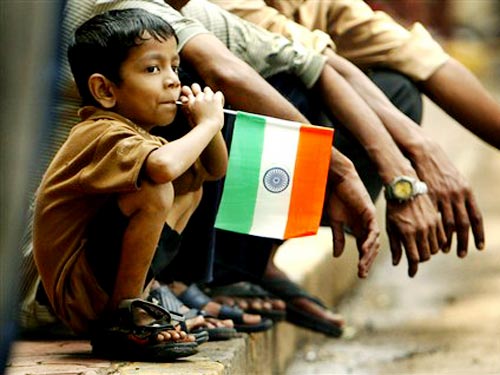
Some weep because they part,
And languish broken hearted,
And others – O my heart !
Because they never parted.
…American poet, Thomas Bailey Aldrich [1836-1907]
PARTITION OF INDIA v/s INDEPENDENCE OF INDIA
India has ‘celebrated’ yet another ‘independence day’ yesterday, August 15, but no body gave any thought on the reality of this so-called independence day. In fact, 62 years ago, India was once again cut to pieces on this day—August 15 (1947)— with the involvement of massacre of tens of thousands of innocent civilians. Tens of thousands of women were also raped and killed with utmost brutality. Does this mean Independence? Should Indians rejoice or mourn on August 15 each year? The August 15, 1947 was not the first partition of India! Ten years earlier it was also partitioned when Burma (now Myanmar) was allowed to be separated from mother India. At this wanton partition no body had raised any hue and cry.
Until April 1937, Myanmar (Burma) was also part and parcel of India. The conspiracy hatched by the unwise Indian leaders of that time with the ruling British regime had led to the separation of Burma from India in 1937 to form an independent Burmese Government. But only five years later, in 1942, it (Burma) was occupied by the Japanese whose occupation continued up to 1945. Only in 1948 that Burma turned fully independent, but it never rejoined India.
Just after 10 years when Burma had separated from India, yet another partition of India was carried out, in 1947 by the unwise and selfish leadership of this country. This time two vast and beautiful areas of India—one from the east (Bengal) and one from the west (Punjab)—were heterogeneously carved out of India and a ‘bilobal’ Pakistan was senselessly created.
No less that 1.7 million people were mercilessly butchered by this unorganized and hasty partition of a vast nation by the unwise leaders. In 1971 the East Pakistan emerged out as Bangladesh but not without terrible shedding of blood. Hundreds of thousands of innocent people were again killed by the military dictators of Pakistan. The killers of Bengalis in East Pakistan were mostly those who were fully “Indians” before the partition of India.
The English poet and critic, Samuel Tayulor Coleridge [1772-1834], in his “Couplet Written in a Volume of Poems” had tried to depict the pain of human suffering following a partition:
To meet to know, to love—and then to part,
Is the sad tale of many a human heart.
Similarly, the English poet George Gordon Byron [1788-1824], in his poetry titled “When We Two Parted” had expressed the same painful human feelings of a partition :
When we two parted In silence and tears,
Half broken-hearted To sever for years.
THE NAMING OF “PAKISTAN”
At the time of partition of India a very unpleasant mistake was committed by the ‘intelligent’ leaders of that time. The alienated part of India was mindlessly accepted by the name of “PAKISTAN”, without caring about the meaning of this senseless acceptance. If the part that land which was allowed to be separated from India was termed as “PAKISTAN”, then it was automatically accepted that rest of India was left as “UNPAK”-STAN or ‘Impure Land’ or a ‘Defiled Nation’. That was—and is still—highly shameful. The name “Pakistan” should have never been accepted by any patriotic and educated Indian leader as it directly insulted rest or remaining part of India or Indian land. There could have been many more choices as a substitute for the nomenclature of “Pakistan”, like “Islamistan”, ‘Muslimstan”, “Kuranistan”, “Allahland’, ‘Jinnah Land”, etc.-etc., but never “Pakistan”. But Alas! The selfish leaders of India of that time were in such a great hurry that they wanted to get rid of their Muslim counterparts as early as possible so that Pandit Jawahar Llal Nehru could peacefully rule the remaining ‘un-Pakistani’ part of India.
The phrase ‘”What’s in a name”, first used by William Shakespeare in his play “Romeo and Juliet” entirely fails to corroborate its theme with the naming of “Pakistan” following the partition of India. Shakespeare had written :
What’s in a name ? that which we call a rose
By any other name would smell as sweet.
The creation of Pakistan by the partition of India has never produced any sweet smell for the common man. Common people of both the countries are equally suffering ever since partition.
Until India, Pakistan, Banglades, and Burma (Myanmar) rejoin each other to form a greater federation, celebrating any independence day following the departure of British rulers from the Indian subcontinent is meaningless.



